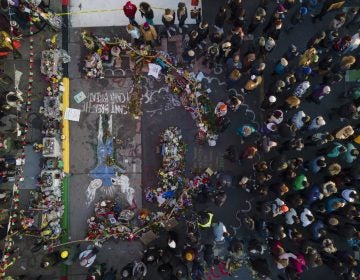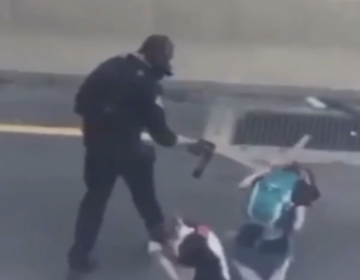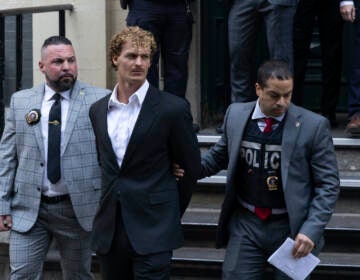‘The war is far from over’: What the Chauvin verdict means to Philadelphia
Morning Edition host Jennifer Lynn talks with Chris Norris, WHYY’s Managing Editor for Community Engagement, about the Chauvin verdict.
Listen 6:39
Protesters marched from South Philadelphia to City Hall on June 23, 2020, demanding an end to police brutality during ongoing demonstrations in Philadelphia. (Kimberly Paynter/WHYY)
Many Americans are still processing Tuesday’s news that a jury found Derek Chauvin, a white former police officer, guilty of murder in the death of African American George Floyd on a Minneapolis street last year.
Morning Edition host Jennifer Lynn asked WHYY’s Managing Editor for Community Engagement Christopher Norris to weigh in on what this verdict means to Philadelphia. Chris is host of the WHYY-TV special “Police Reimagined” – a forum for community leaders to discuss the future of public safety with an eye on changing the way Black Philadelphians are treated.
–
Good morning, Chris.
Good morning, Jennifer.
Chris, I’m not sure where to begin a conversation of what has happened. What was your reaction to the Chauvin verdict?
Yeah, you know, sadly, my reaction was shock because after years of seeing police harm Black bodies with impunity, I no longer expected accountability. So I’m pleased, but not satisfied. And to your larger question as to where we begin the conversation, I think the answer is managing expectations. The community needs to know that the verdict deserves to be celebrated because we’ve won the battle. But the war is far from over.
Yeah, and Chris, yesterday after the guilty verdict, Minnesota’s attorney general said that he wouldn’t call the murder conviction of Derek Chauvin justice. He says justice implies true restoration. He says it’s accountability, which is a first step toward justice. Your thoughts on that?
I agree completely. And I think language is important. You know, justice is about the entire system. There’s nothing just about watching a murder on tape and having police officers testify against their brother in blue and still have to hold your breath and hope for the best. There’s nothing just about a system that allows officers like Derek Chauvin to get away with this time after time after time. So this particular verdict was about accountability. What we want to get to is a system of justice, which is fairness and reasonable.
Yeah, and that takes a lot of work. We’ll talk about that in a moment. Now, the work that you do day in/day out really taps into a lot of local voices and conversations about race and policing. Who are you hearing from about the verdict? What are they saying?
Over the last 24 hours, I guess hasn’t even really been 24 hours yet. But I’ve heard from a lot of different people. I’ve heard from the former chief public defender in Philadelphia who was jubilant but also adamant that we need and have more to do. I talked to my buddy Ikey Raw, founder of the Justice for David Jones Coalition, who said, you know, “I feel good, but I’m incomplete.” You know, I heard from a brother of mine who’s a criminologist who said, you know, “We shouldn’t get too excited that the system works, that a guilty verdict is what’s supposed to happen. It wasn’t a favor to Black people.” And I’ve heard from people who were just so thanking God that they just expected the worst but was surprised with the best.
Yeah, and Philadelphia has a long history of police brutality. There are cases in this city that have yet to be resolved. You mentioned David Jones. I believe that was the person who was on the ATV and was shot. What effect could the conviction of Derek Chauvin have on such cases?
Honestly, I think the only effect is hope. And hope is a big deal, especially to people who have been accustomed to living without it. There’s now a greater hope that when Ryan Pownall gets his day in court for the murder of David Jones, who, as you alluded to, was killed during a traffic stop in June of 2017, that he will be held accountable. There’s a greater hope that we will soon hear about the prosecution of Sean Matarazzo and Thomas Munz, the still-employed cops who killed Walter Wallace last fall. There’s now a greater hope that Eric Ruch Jr., who fatally shot 25-year-old Dennis Plowden on an East Germantown sidewalk and who had been charged with murder, will be held accountable when he has his day in court. So we have hope, and that’s more than we had yesterday.
Yeah. Chris, George Floyd’s death and the death of so many other Black men and women at the hands of officers really created momentum toward reforming policing, making communities safer for people of color. But we can’t just go by momentum like, is this push working or are there going to be some changes? I am thinking legislatively.
You know, in Philly, we are not as far along as we should be. But with that said, Councilman Kenyatta Johnson’s Let Philly Breathe bill which bans chokeholds was passed by the City Council last year. Also last year, Philadelphia voters approved a new independent government body called the Citizen’s Police Oversight Commission. But there’s few details on how it will work and how it will be funded. Where we need to go as a city is to truly reimagine policing. And we can start by putting into motion public safety officers, which was a new class of law enforcement officers that was approved by Philadelphia voters in 2019, but which has yet to materialize on that street. These unarmed officers would be tasked with controlling traffic and enforcing other quality-of-life laws. So, in short, the biggest change we can make right now is getting police out of the traffic stop business.
Yeah, and we can’t view the entire police profession through the story of what Derek Chauvin has done. How do you see men and women on the force being leaders for change speaking out?
Honestly, it’s breaking the proverbial blue wall of silence. What was so transformative in this particular case was that you had the police officers and the city’s police chief testifying against Mr. Chauvin. “This isn’t… this doesn’t represent us.” You know, “what this gentleman did on May 25, 2020 is not in our training model. This is not how we go about protecting and serving our communities.” And so we need more officers, who consider themselves to be good police, to speak out against bad police because bad police make the job harder for good police.
All right. Well said. Chris Norris. Thank you very much, Chris.
My pleasure.
Chris is WHYY’s Managing Editor for Community Engagement.

Get daily updates from WHYY News!
WHYY is your source for fact-based, in-depth journalism and information. As a nonprofit organization, we rely on financial support from readers like you. Please give today.







